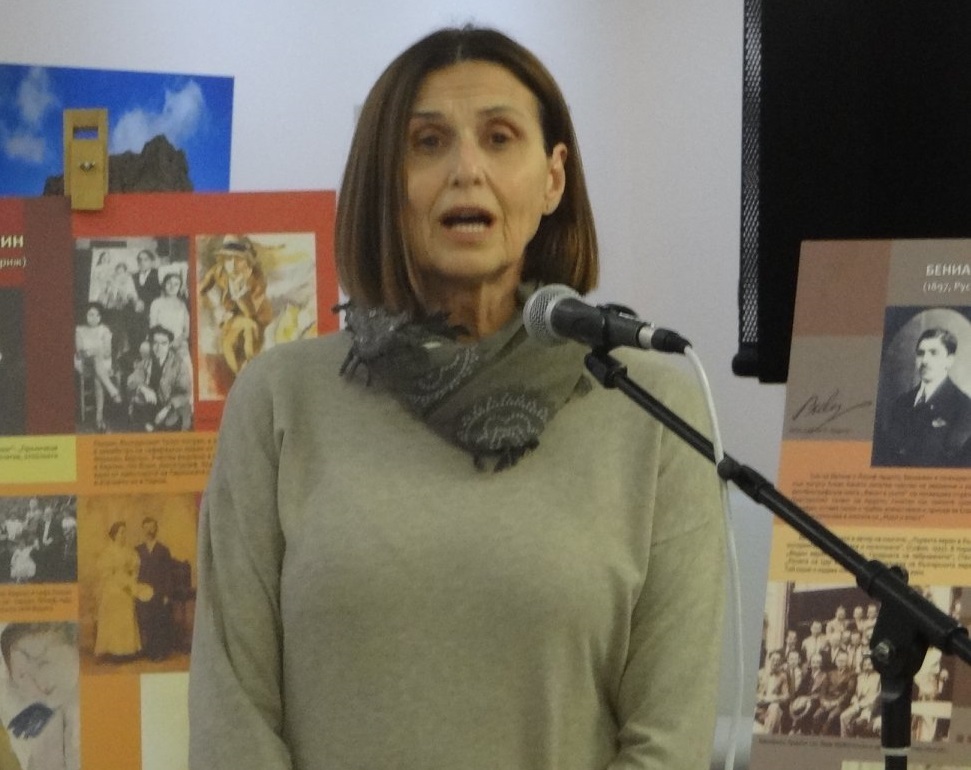
/Detelina Kamenova, media relations, International Elias Canetti Society, journalist/

/Rayna Breuer, author of “Block 317”
Rayna Breuer is this year’s discovery of the International Elias Canetti Society. On October 5th she came to Ruse to take part in “The Breath of Europe”. This is her first presentation at a literary festival in Bulgaria, and with her first published novel “Block 317”. Rayna Breuer gave a special interview for the festival.
- What do you think gives a literary festival the strength to survive for 15 consecutive years?
The tenacity of the people behind the festival. If it’s not them, then we authors won’t be able to read, to get in touch with the audience, to come out of our bubble. There must be 1001 reasons to say: so far. No more. Be it for financial or other difficulties, such as regulatory norms (e.g. Covid) and others. But as long as the desire and perseverance are stronger than the obstacles, there will be festivals like the one in Ruse. An audience, in my opinion, is always found. People want to read. I even think that the social media fatigue is palpable and I hope people will come back to books and long reads.
- What do you know in particular about the festival organised by the International Elias Canetti Society and what is its place among other literary festivals in Europe and Bulgaria?
I think festivals like the one in Ruse are extremely important for two reasons.
Yes, we all want to present our book in Vienna, Frankfurt or London. Yes, it is nice there, there is an audience, the halls are full. But these festivals are huge, one – be it visitor, author or publisher – gets lost in the sea of books. As much as I enjoyed reading at the Vienna Book Fair, I find that at such smaller festivals the interaction with the audience is more direct, more emotional, more natural, more personal.
I’ve never been to the Ruse Literary Festival before, so I can’t say anything at the moment other than that I’m extremely happy to have been invited and I’m very grateful for the professional communication and organisation around the preparations. I look forward to meeting the audience and visiting Ruse.
- Why does a writer, a poet, an artist even need to meet live with an audience and be presented at festivals?
Because writing is not a one-way street – the audience is our corrective, our mirror, they are our honest critics. I couldn’t write just for myself, or just because that’s what I felt I had to say. If so, I might as well write a personal diary. No, I want a dialogue with the audience. And especially nowadays, the dialogue is very, very important. And that’s why festivals like this are important, to have a meeting place, a place to interact with people, to not break contact.
- What do you expect from the live meetings with the audience in Ruse?
This will be my first meeting with a Bulgarian audience. My book came out last year in German. I am very grateful to the Elias Canetti Publishing House for translating a few chapters so that I could present them to the Bulgarian audience. I have to admit, I am very excited. This is, after all, my first book. I was surprised that there was a lot of interest in Germany and Austria, for my modest expectations. I thought I was writing it only for the Bulgarian community in Germany, for those who could understand and feel what I wrote, for those who had lived through it, but it turned out that Germans were also curious to find out what was happening in Bulgaria in the 1990s and how people lived then. Meeting the Bulgarian audience will be different, they know what happened in the 90s. Now the big question will be whether they have the same memories, the same interpretation – and that’s what I’m interested in. I want to find out how ready we are to talk about the past, HOW we talk about the past, do we point fingers and at whom. What have we learned from the last 20 – 30 years that wasn’t taught in school. Are we ready for that? Some of my characters in the book are not ready, others are. It took me personally years to figure out what it was.
- What should the audience expect from meeting you?
What I wanted to accomplish with my book is to lay the groundwork for dialogue through humor. I hope I have succeeded – the audience will judge. With this book in my hands, I want to have a conversation with my grandparents’ generation, who are now gone, with my parents’ generation, and with my generation – in Germany there is a term for this: Generation der Nachwendekinder, these are those who were born around 1989. Each generation has gone its own way, has made mistakes, and I want to know if we are ready to talk together and reflect on our actions. That is to say, in a nutshell: I want a dialogue, which is becoming increasingly difficult again nowadays. But with a bit of humour it might be easier to talk.
- Where do we find more space for artistic interpretation – in real life or on social media?
I personally get inspiration from real life, from meeting different people, from their stories….There are the real emotions, there is life. Social media is more and more becoming a maze with no way out. With no orientation, one loses one’s compass more and more easily. And that worries me.
- How do you see geographical borders today, when the world is experiencing tremors of a different, supranational nature?
This is a difficult question that has many facettes. I would put it this way – the word geographical borders does not exist for me. Thanks to Europe. Having the privilege of travelling the world, of interacting with other people, of learning about new cultures, that is a tremendous richness that one has fought for, but that is not eternal, that we also need to understand. What worries me more is not the geographical borders, but the borders that are beginning to rise up in our heads and block us.

